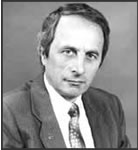Zaitsev, Alexander (1945–2021)
Alexander Zaitsev was chief scientist at the Russian Academy of Science's Institute of Radio Engineering and Electronics. Zaitsev also headed the group which transmitted Team Encounter's interstellar messages using the Evpatoria Deep Space Center (EDSC) in Ukraine (for details of these messages, see CETI) and also served as the SETI League's Regional Coordinator for Russia.
Zaitsev's career focused on three main fields: (1) The theory behind, and the design and implementation of, radar devices used in the study of Venus, Mars, and Mercury. Specifically, Zaitsev was interested in direct digital synthesizers of coherent radar signals (the subject of his MS thesis, 1981). (2) Near-Earth asteroid radar research (the subject of his dissertation, 1997). (3) Interstellar radio messaging (his chief current present). He was a member of the Space Guard Foundation.
In 1992 Zaitsev led a team of radio astronomers which successfully tracked the asteroid 4179 Toutatis to a distance of 3.6 million kilometers from Earth, using the Evpatoria 70-meter (230-foot) diameter dish as the transmitting antenna. Together with his colleagues, Zaitsev also conducted pioneering work in radar composition analysis studies of asteroids and planetary bodies. Following one of his institute's organizational goals of finding beneficial applications for scientific achievements, Zaitsev developed concepts for radar composition analysis and tracking of near Earth asteroids and comets to better understand if they could pose a future hazard to Earth.
Zaitsev received his BS degree in radio engineering from the Moscow Mining University in 1967, and his MS and PhD in radar astronomy from the Institute of Radio Engineering and Electronics, Russian Academy of Science, Moscow.
 |


